
Iterator (iterator) is a lazy iterable object (lazy iterable). The range function is a lazy iterable object in Python 3. So, is range an iterator? Why.
TLNR: Range objects in Python 3 (xrange objects in Python 2) are lazy, but range objects are not iterators.
Yes , this is very confusing
When talking about iterators (iterators) and iterable objects (iterables) in Python, you are likely to hear someone repeat that range is an iterator. misunderstanding. I think this is a very serious misunderstanding. If you think that range objects are iterators, then your mental model of "how iterators work" is not clear enough. In a sense, ranges and iterators are both "lazy", but they achieve "laziness" in quite different ways.
What is an iterator
In Python, An iterable is anything you can iterate over, and an iterator is what you actually iterate over.
Iter-ables are able to be iterated over. Iter-ators are the agents that perform the iteration.
You can use the iter function to get an iterator from any iterable object:

Once you have With an iterator, the only thing you can do with it is get its next element:
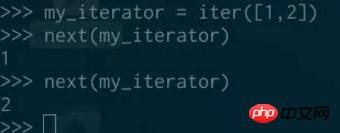
If there is no more If there are too many elements, a stop iteration exception will be thrown:

##All iterators are iterable objects , meaning you can get an iterator from an iterator, so you can iterate over an iterator:

#It should be pointed out that iterators are stateful, after looping through an iterator once, if you try to loop again, it will be empty:
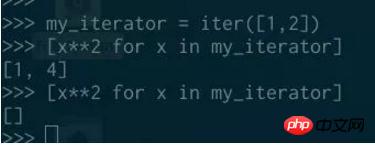
##In Python 3, enumerate, zip, reversed<span style="color: rgb(103, 103, 103);"></span> and some other built-in functions return iterators:
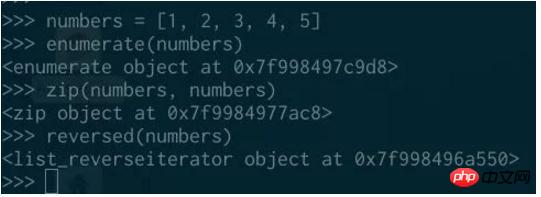
generator (whatever comes from the generator function or a generator expression) is a simple way to create an iterator:

I often say that iterators are lazy A one-time iterable object. "Lazy" because they only count items in a loop, "single-use" because once an element is "consumed" from an iterator, the element is gone forever.
What is range
The range object in Python 3 (Python 2) can be looped like any other iterable object:
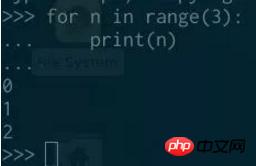
Because range is an iterable object, So you can get an iterator from it:

But the range object itself is not an iterator, we cannot call it on the range object next:

Unlike iterators, we can iterate over a range object without "consuming" it:
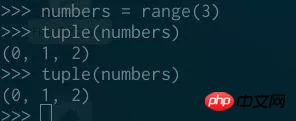
If we do this using an iterator, we won’t get any elements the second time through the loop:
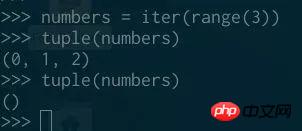
Zongshang, and <span style="color: rgb(103, 103, 103);">zip</span>, <span style="color: rgb(103, 103, 103);">enumerate</span>, or <span style="color: rgb(103, 103, 103);">generator</span> objects are different, and the range object is not an iterator.
So, what exactly is range?
The range object is in a certain It is "lazy" in the sense that it does not generate every number it contains when it is created. Instead, it returns these numbers to us when we need them in the loop.
The following is a range object and a generator (a kind of iterator):

##Unlike generators, range objects have length:
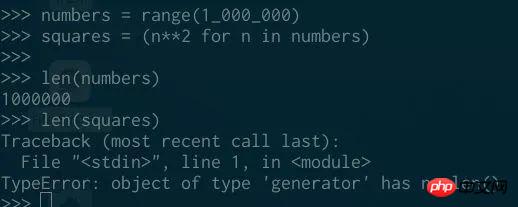
and can be indexed:

Unlike iterators, you can ask them whether they contain an element without changing their state:
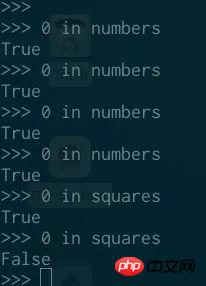
#If you want a description of range objects, you can call them <span style="color: rgb(103, 103, 103);">Lazy Sequences</span>, range is a sequence (such as list, tuple and string), but it does not contain any content in memory, but answers the question through calculation.
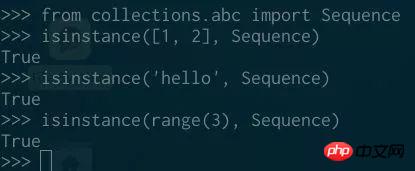
#Why this distinction is important
If I tell you that an object is an iterator, you will know that when you call the iter function on this object, you will always get the same object (by definition):

Make sure you can call the next function on this object, because the next function can be called on all iterators:
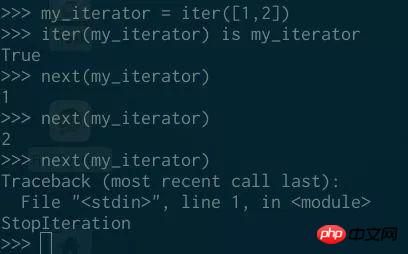
And you will know that when iterating over it, the elements will be consumed from the iterator, sometimes this feature can come in handy Usage (handling iterators in a special way):

So although it seems that "lazy iterable object" and " The difference between "iterator" is subtle, but these terms do mean different things. While "lazy iterable object" is a very general term with no specific meaning, the word "iterator" means an object with very specific behavior.
Summary
If you know you can loop over an object, it is an iterable (iterable ).
If you know that the object you are looping over is calculated while looping, then this is a lazy iterable object (lazy iterable).
If you know you can pass something to the next function, it is an iterator (which is the most common lazy iterable object).
If you can loop multiple times without "exhausting" it, it's not an iterator. If you can't pass something to the next function, then it's not an iterator. Python 3's range objects are not iterators. If you are instructing someone about range objects, please do not use the word "iterator". This is very confusing and may lead others to start abusing the word "iterator"
Related recommendations:
Detailed description of iterators
Understanding of iterable objects and iterator objects in Python
The above is the detailed content of Discussion on whether the range object in Python is an iterator. For more information, please follow other related articles on the PHP Chinese website!




